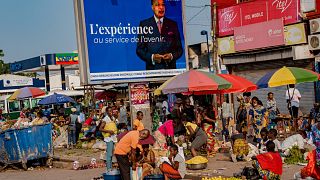Republic of the Congo
It is a gesture that can save lives … and Sardou is fully aware of this. Every 3 months, he donates his blood. A tragic event led to this kind gesture.
‘‘I decided to give my blood today because one of my friends lost his mother because of a lack of blood. And it touched me to see him all sad. And also, the priest of our parish is someone who fights a lot for blood donation. So every time he preaches to the church for blood donation’‘, he said.
Although some people do not hesitate to donate blood, others are more reluctant. In the Republic of the Congo, as in most African countries, there is a serious lack of donors. Some have fear for syringes while some have other reasons.
‘‘So among the factors that hinder blood donation, there are purely cultural considerations. Elsewhere people think that blood is mystical, so they mystify the gift of blood around their beliefs. There is also the fact that people think that blood donated is sold. It is a fixed cost determined by the government, it is a contribution of the population to enable us to renew these products’‘, said Dr. Jean-Pierre Pambou.
The consequences of this shortage of blood are disastrous for the sick. To raise awareness, blood banks can count on the support of civil society groups.
The Republic of the Congo also had to resort to an original method in force elsewhere on the continent: the system of reimbursement or replacement. When a patient needs blood, he needs to find a donor among his relatives to replace the blood bag used.
‘‘In the Congo we need 6,000 blood bags every month to save all lives. Increased awareness has begun. For the past 4 months we have reached our goals, before the blood bank was empty. But it is also thanks to this system of reimbursement which constitutes a safety net’‘, President of Loemba foundation, Pascal Loemba added.
Around the world supply of blood is insufficient. Countries therefore resort to various methods to encourage people to donate blood. In the United States or Tanzania, for example, blood donors are paid, an issue that raises moral concerns over merchandising of the human body and remains a taboo.
But as long as science has not managed to create artificial blood, the shortage raises concerns while increased awareness is being encouraged.













Go to video
White House confirms Trump diagnosed with common vascular condition
01:49
BRICS summit ends on health issues and role of global south countries
00:50
Ons Jabeur retires from Wimbledon Opener due to breathing issues
Go to video
In Kenya, 90% of packaged food needs health warning label under new rules
11:15
AI drones lead breakthrough against malaria in Africa [Business Africa]
01:29
Experts warn of danger of exercising in extreme heat and humidity